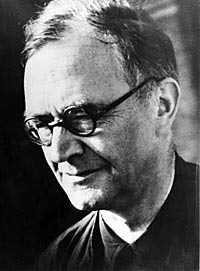Readings:
Psalm 76:7-12
Jeremiah 30:23–31:6
Romans 7:14-25
John 8:34-36Preface of a Saint (1)
PRAYER (traditional language)
Almighty God, source of justice beyond human knowledge: We offer thanks that thou didst inspire Karl Barth to resist tyranny and exalt thy saving grace, without which we cannot apprehend thy will. Teach us, like him, to live by faith, and even in chaotic and perilous times to perceive the light of thy eternal glory, Jesus Christ our Redeemer; who livest and reignest with thee and the Holy Spirit, ever one God, throughout all ages. Amen.
PRAYER (contemporary language)
Almighty God, source of justice beyond human knowledge: We thank you for inspiring Karl Barth to resist tyranny and exalt your saving grace, without which we cannot apprehend your will. Teach us, like him, to live by faith, and even in chaotic and perilous times to perceive the light of your eternal glory, Jesus Christ our Redeemer; who lives and reigns with you and the Holy Spirit, ever one God, throughout all ages. Amen.
Thei commemoration appears in A Great Cloud of Witnesses.
Return to Lectionary Home Page
Webmaster: Charles Wohlers
Last updated: 10 October 2020
KARL BARTH
PASTOR AND THEOLOGIAN, 1968
 Karl Barth (May 10, 1886– December 10, 1968) (pronounced "bart") was a Swiss Reformed theologian whom critics hold to be among the most important Christian thinkers of the 20th century; Pope Pius XII described him as the most important theologian since Thomas Aquinas. Beginning with his experience as a pastor, he rejected his training in the predominant liberal theology typical of 19th-century European Protestantism. Instead he embarked on a new theological path initially called dialectical theology, due to its stress on the paradoxical nature of divine truth (e.g., God's relationship to humanity embodies both grace and judgment). Other critics have referred to Barth as the father of neo-orthodoxy — a term emphatically rejected by Barth himself. The most accurate description of his work might be "a theology of the Word." Barth's theological thought emphasized the sovereignty of God, particularly through his innovative doctrine of election.
Karl Barth (May 10, 1886– December 10, 1968) (pronounced "bart") was a Swiss Reformed theologian whom critics hold to be among the most important Christian thinkers of the 20th century; Pope Pius XII described him as the most important theologian since Thomas Aquinas. Beginning with his experience as a pastor, he rejected his training in the predominant liberal theology typical of 19th-century European Protestantism. Instead he embarked on a new theological path initially called dialectical theology, due to its stress on the paradoxical nature of divine truth (e.g., God's relationship to humanity embodies both grace and judgment). Other critics have referred to Barth as the father of neo-orthodoxy — a term emphatically rejected by Barth himself. The most accurate description of his work might be "a theology of the Word." Barth's theological thought emphasized the sovereignty of God, particularly through his innovative doctrine of election.
In his commentary The Epistle to the Romans (Ger. Der Römerbrief; particularly in the thoroughly re-written second edition of 1922) Barth argued that the God who is revealed in the cross of Jesus challenges and overthrows any attempt to ally God with human cultures, achievements, or possessions. Many theologians believe this work to be the most important theological treatise since Friedrich Schleiermacher.
In the decade following the First World War, Barth was linked with a number of other theologians, actually very diverse in outlook, who had reacted against their teachers' liberalism, in a movement known as "Dialectical Theology". Other members of the movement included Rudolf Bultmann, Eduard Thurneysen, Emil Brunner, and Friedrich Gogarten.
In 1934, as the Protestant Church attempted to come to terms with the Third Reich, Barth was largely responsible for the writing of the Barmen declaration which rejected the influence of Nazism on German Christianity—arguing that the Church's allegiance to the God of Jesus Christ should give it the impetus and resources to resist the influence of other 'lords'—such as the German Führer, Adolf Hitler. Barth mailed this declaration to Hitler personally. This was one of the founding documents of the Confessing Church.
Barth's theology found its most sustained and compelling expression through his thirteen-volume magnum opus, the Church Dogmatics. Widely regarded as one of the most important theological works of the century, the Church Dogmatics represents the pinnacle of Barth's achievement as a theologian. Barth published the first part-volume of the Dogmatics in 1932 and continued working on it until his death in 1968, by which time it was 6 million words long in thirteen part-volumes.
Barth tries to recover the Doctrine of the Trinity in theology from its putative loss in liberalism. His argument follows from the idea that God is the object of God’s own self-knowledge, and revelation in the Bible means the self-unveiling to humanity of the God who cannot be discovered by humanity simply through its own intuition. Although Barth's theology rejected German Protestant liberalism, his theology has usually not found favour with those at the other end of the theological spectrum: confessionalists and fundamentalists.
from Wikipedia